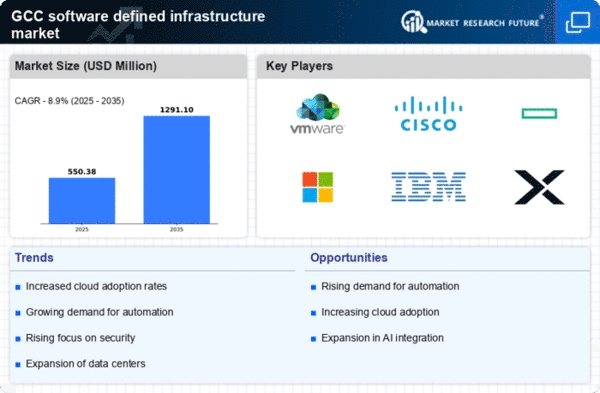Rising Demand for Scalability
The software defined-infrastructure market is experiencing a notable surge in demand for scalability solutions. Organizations in the GCC are increasingly seeking infrastructure that can adapt to fluctuating workloads and business needs. This trend is driven by the necessity for efficient resource allocation and cost management. According to recent data, the GCC region is projected to witness a growth rate of approximately 15% in the adoption of scalable infrastructure solutions over the next five years. Companies are recognizing that traditional infrastructure models may not suffice in meeting their dynamic requirements. As a result, the software defined-infrastructure market is becoming a focal point for businesses aiming to enhance operational efficiency and responsiveness.
Shift Towards Cost Efficiency
Cost efficiency remains a pivotal driver in the software defined-infrastructure market. Organizations in the GCC are increasingly focused on optimizing their IT expenditures while maintaining high performance. The shift towards software defined solutions allows for better resource utilization and reduced operational costs. Recent studies indicate that businesses can achieve up to 30% savings in infrastructure costs by transitioning to software defined models. This financial incentive is compelling many companies to reevaluate their existing infrastructure strategies. As the market evolves, the emphasis on cost-effective solutions is likely to shape the competitive landscape, prompting vendors to innovate and offer more value-driven services.
Growing Emphasis on Flexibility
Flexibility is emerging as a critical driver in the software defined-infrastructure market. Organizations in the GCC are increasingly prioritizing the ability to quickly adapt to changing business environments. This flexibility is essential for supporting diverse workloads and applications. The software defined approach enables businesses to reconfigure their infrastructure with minimal disruption, thereby enhancing agility. As companies strive to remain competitive, the demand for flexible infrastructure solutions is expected to rise. Market analysts suggest that this trend could lead to a 20% increase in the adoption of software defined technologies in the region over the next few years, as organizations seek to future-proof their operations.
Increased Focus on Data Management
Data management is becoming a significant driver in the software defined-infrastructure market. With the exponential growth of data generated by businesses in the GCC, effective management solutions are essential. Organizations are recognizing the need for infrastructure that can seamlessly integrate data storage, processing, and analytics. The software defined approach offers enhanced capabilities for managing large volumes of data efficiently. Recent reports indicate that the demand for advanced data management solutions is expected to grow by 25% in the coming years. This trend underscores the importance of robust infrastructure in supporting data-driven decision-making and operational excellence.
Enhanced Collaboration and Integration
Collaboration and integration capabilities are increasingly influencing the software defined-infrastructure market. As organizations in the GCC adopt hybrid and multi-cloud strategies, the need for seamless integration across various platforms becomes paramount. Software defined solutions facilitate better collaboration among different IT components, enabling organizations to leverage the best of multiple environments. This trend is likely to drive a 15% increase in the adoption of integrated software defined solutions in the region. Companies are recognizing that enhanced collaboration not only improves operational efficiency but also fosters innovation, making it a key driver in the evolving landscape of the software defined-infrastructure market.
















